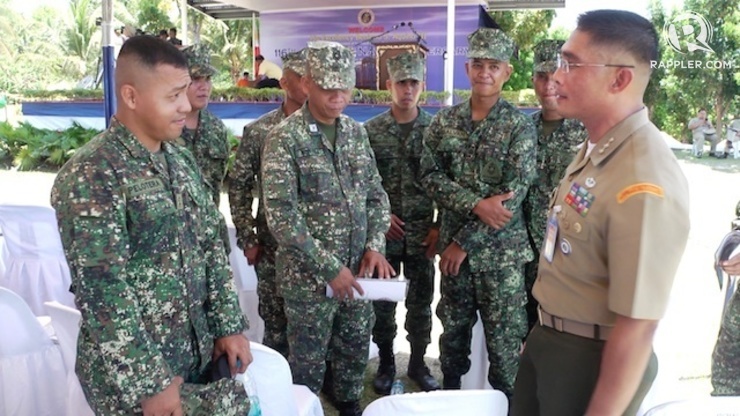The next mission to Ayungin might be more difficult, soldiers tell Rappler

AYUNGIN MARINES:
Lieutenant Mike Pelotera and fellow Marines deployed to the West Philippines
Sea
It's been two months since the Philippine Navy evaded a Chinese Coast Guard blockade that trapped 9 Marines in the disputed Ayungin Shoal, a much-publicized incident in the high seas that culminated in the successful rotation of Philippine troops there.
Lieutenant Mike Pelotera is back on land, was able to spend time with his family, is sporting a new haircut, and has shaved his beard. But his thoughts remain in BRP Sierra Madre, the grounded Philippine Navy ship that has served as an unconventional naval detachment in the
He is worried that the next rotation mission to Ayungin Shoal would be more difficult.
"'Yung pag-re supply at pagpalit sa amin successful. Medyo may worry kami kaunti dahil doon sa epekto ng nangyari sa nakaraan. Sana this coming resupply o reprovisioning, sana maging successful din yung outcome nung operations pagdating sa palitan ng tropa," Pelotera said. (The previous resupply and rotation mission was successful. We worry about its impact. We hope that the next reprovisioning and rotation miision will also be successful.)
Rappler spoke with Pelotera on Tuesday, May 27, during the 116th anniversary celebration of the Philippine Navy in the Naval Forces West headquarters in
Fear of 'miscalculation'
Security officials who spoke with Rappler on condition of anonymity said they fear "miscalculations" at sea.
The next rotation would test how far
"
Marines are normally deployed there for 3 months. But it's not normal times. Pelotera and 8 others were trapped there for 5 months, forcing the headquarters to airdrop essential supplies.
China has accused the Philippine government of reneging on its supposed earlier commitment in relation to Ayungin in the West Philippine Sea (South China Sea), which
Chinese Foreign Ministry spokesman Hong Lei earlier said the
The
Rising tension
The situation in the
Following the
There is no saying how long the current batch of Philippine Marines is going to stay at sea. Even in peaceful times, deployment is punishing because of the heat, limited supply of food and drinking water, and, above all, loneliness.
Filipino Marines and sailors deployed in the disputed waters get special training. They are prepared for worst-case scenarios.
“Buhay ng sundalo ay may halong hirap. Hanggang nandito ang armed foces natin willing kaming itaya ang buhay naming madepensahan lang ang terriroryo natin," Pelotera said. (The life of a soldier is rife with difficulties. Your armed forces are willing to give up our lives to defend our territory.)
One of the weakest in Asia, the Philippine military doesn't stand a chance against
Delay, if not repel
"They are ready to at least delay, if not repel, the enemy and give warning to the mainland," said Parreño.
“Our men are ready for any contingencies that might come. They are ready to give up their lives and what is important is they can perform their duty," he added.
As facilities are upgraded and modern assets are acquired, Navy chief Vice Admiral Jesus Millan said wars – if the situation comes to that – are won by men and not by machines.
"They are our best weapons. In the distant and solitary posts out there in the West Philippines Sea, where the only frequent visitors of our marines and sailors are loneliness and uncertainty, our country’s best hope that [they will] stand their ground hinges on [their] indomitable courage and strong resolve to serve [their] country.”
http://www.rappler.com/nation/59149-ayungin-rotation-mission

No comments:
Post a Comment
Note: Only a member of this blog may post a comment.